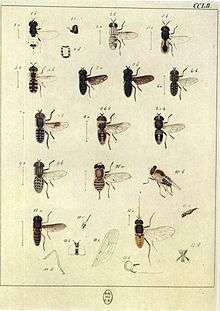Nemestrinidae
| Nemestrinidae | |
|---|---|
 | |
| Nemestrinidae wing veins | |
| Scientific classification | |
| Kingdom: | Animalia |
| Phylum: | Arthropoda |
| Class: | Insecta |
| Order: | Diptera |
| Suborder: | Brachycera |
| Infraorder: | Asilomorpha |
| Superfamily: | Nemestrinoidea |
| Family: | Nemestrinidae |
| Subfamilies | |
| |

Neorhynchocephalus tauscheri (10) and
Hirmoneura obscura (11) in Europäischen Zweiflügeligen
Nemestrinidae, or tangle-veined flies is a family of flies in the superfamily Nemestrinoidea, closely related to Acroceridae. The family is small but distributed worldwide, with about 300 species in 34 genera. Larvae are endoparasitoids of either grasshoppers (Trichopsideinae) or scarab beetles (Hirmoneurinae). Some are considered important in the control of grasshopper populations. Adults are often observed on flowers.
Fossil history
Fossils of Nemestrinidae are known from several localities of various ages in Russia, Kazakhstan, Mongolia, Western Europe and North America, with the oldest fossils being found in the Middle-Upper Jurassic Karabastau Formation.[1][2][3]
References
- ↑ Mostovski, M.B. 1998. Revision of the tangle-vein flies (Diptera, Nemestrinidae) described by B.B. Rohdendorf, and new taxa of nemestrinids from the Upper Jurassic of Kazakhstan. Paleontological Journal, 4: 47-53.
- ↑ Ansorge, J., Mostovski, M.B. 2000. Redescription of Prohirmoneura jurassica Handlirsch 1906 (Diptera: Nemestrinidae) from the Lower Tithonian lithographic limestone of Eichstaett. N. Jb. Geol. Palaeont. Mh. 4: 235-243.
- ↑ Wedmann, S. 2007. A nemestrinid fly (Insecta: Diptera: Nemestrinidae: cf. Hirmoneura) from the Eocene Messel pit (Germany). Journal of Paleontology 81 (5): 1114-1117.
External links
- The genera of the family Nemestrinidae (Diptera: Brachycera) Nelson Bernardi in Arquivos de Zoologia versão ISSN 0066-7870 Arq. Zool. vol.24 no.4 São Paulo dez. 1973
- Images at Diptera info
- Images at BugGuide
- Bishop Museum
- U.S.D.A. Biological Control of Grasshoppers
- Discover Life
This article is issued from Wikipedia - version of the 5/31/2016. The text is available under the Creative Commons Attribution/Share Alike but additional terms may apply for the media files.